Twelve faculty have been selected to receive the President’s Award for Excellence in Teaching, which honors those who have demonstrated exceptional accomplishments in teaching.
The 2024 honorees represent each school, the College of Arts and Sciences, the Honors College, and the Graduate School.
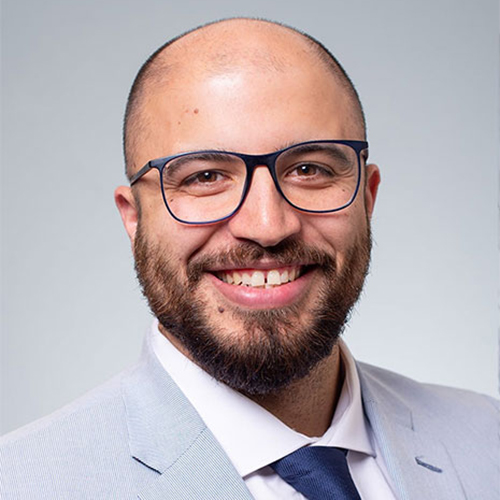
Hussein Basma
School of Dentistry
Hussein Basma, DDS, M.S., is an assistant professor in the Department of Periodontics and course director in Case Based Education 1, Periodontology D3, Periodontology Preceptorship Program, Periodontology Case Conference and Periodontology Digital Dentistry.
“One of the hallmarks of Dr. Basma’s mentorship is his dedication to individualized support,” nominators wrote. “As residents, we have benefited immensely from his personalized guidance, encouragement and genuine investment in our success … whether it’s through extra study sessions, one-on-one consultations or hands-on clinical guidance.”
Basma’s “research in soft and hard tissue augmentation for dental implants has not only advanced the field of periodontology but has also directly influenced our clinical practice,” the nominators continued. “By integrating digital technologies into his research and teaching, Dr. Basma has equipped us with the knowledge and skills needed to navigate the evolving landscape of modern periodontal care.”
“He is deeply engaged in both classic and current literature, constantly integrating new findings into his teaching,” another nominator wrote.
Nominators noted Basma’s dedication to enhancing his students’ clinical skills. “He voluntarily devoted countless hours after school to teach students the art of administering ‘painless’ injections — a skill that has become indispensable in our times in clinic,” according to a nominating letter signed by the Class of 2025. “His methods not only alleviate patient discomfort but also exemplify his tireless efforts to equip us with practical skills essential for our development.”
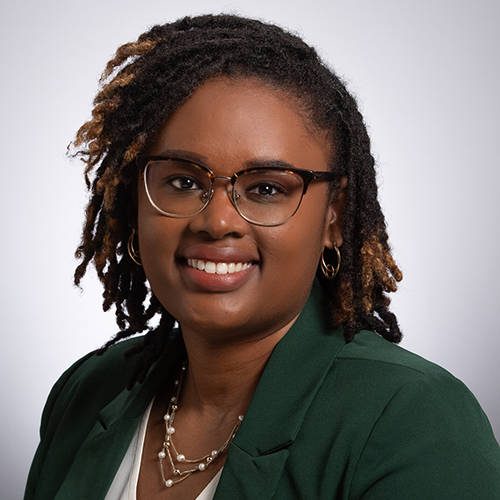
Jessica Chambliss
School of Public Health
Jessica T. Chambliss, Ph.D., MPH, assistant professor in the Department of Health Policy and Organization, is assistant dean of Public Health Practice at the School of Public Health and director of its UAB Gulf Scholars Program. She has been teaching in the school since 2017 and became a faculty member in the Health Policy and Organization department in 2020. She also teaches on public health concepts to medical students at the Heersink School of Medicine. In 2023, she earned Quality Matters certification for her HPO 636 course, Public Health & Healthcare Delivery Systems.
“Dr. Chambliss is able to take difficult subject matter and make it digestible for students of all professional and cultural backgrounds,” one nominator wrote. “Her roles as a practitioner and educator allow her to bridge the gap between public health theory and practice, providing students the knowledge and skills to address current public health issues.”
“My ultimate goal as a teacher is to help students understand how they can, in a positive manner, use the power that they possess to help impact society in a productive way,” Chambliss wrote in her biographical sketch.
“She particularly impresses me with her diligence toward international students,” another nominator wrote. “She is always mindful of the language barrier and dedicates time after each class to offer further training and answer questions.”
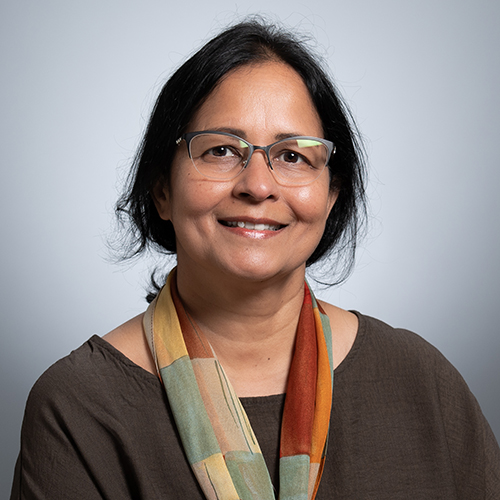
Aparna Dwivedi
Honors College
Aparna Dwivedi, M.A., an instructor in the Department of English since 2017, has had some three decades of teaching experience at the university level. At UAB, she has extensively taught Honors sections for the department’s core course offerings as well as popular Honors seminars, including Witch Narratives and the “immersive and transformational” Forms of Literature: Immigrant Stories Honors section of EH 212, according to a nominator.
In their evaluations, “students use words such as ‘creative,’ ‘compassion,’ ‘kindness,’ ‘inspiring’ and ‘stimulating’ … all words that reflect the Honors College values of belonging, exploring, leading and daring,” the nominator wrote.
“The openness and transparency in my courses begin from the very first class period, as I stand before them, a ‘text’ to be ‘read,’” Dwivedi wrote in her biographical sketch. This is true not only of her professional abilities, Dwivedi continued, “but also in my personal capacity as a first-generation immigrant.”
“Throughout the semester, Dr. Dwivedi incorporated many ways to display what we had learned: We kept a journal, did group and class discussions, wrote an essay, and did a multimodal final project,” a student wrote. “The diverse range of assignments, along with the freedom she gave the students, helped me improve my creativity and critical thinking skills and gain a deeper appreciation for different areas of literature.”
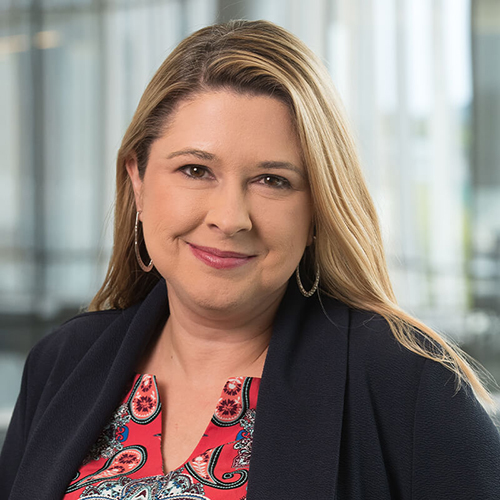
Jennifer Hamrick
Collat School of Business
Jennifer Hamrick, Ph.D., CPA, CFE, CGMA, is an assistant professor in the Department of Accounting and Finance. She teaches courses in Advanced Accounting, External Audit, and Advanced Audit and publishes her academic research in leading accounting journals.
“Dr. Hamrick is known for her engaging lectures, innovative teaching practices, passion for teaching, and concern for her students,” a nominator wrote. “Beyond the classroom, Dr. Hamrick is engaged with the Birmingham professional community. She is focused on maintaining connections to help students at every stage of their careers.”
A student nominator who enrolled in UAB’s master’s in accounting program after 40 years as a practicing certified public accountant elaborated on another way Hamrick helps students in their careers. “She understands the importance of professional networking and encourages students to get involved in accounting organizations,” the student wrote.
“My teaching philosophy is centered on the diversity of students I teach,” Hamrick wrote in her biographical sketch. “Every student is unique.” Last spring, she introduced a visual summary syllabus to ensure students of all learning styles understand key deliverables and expectations. In 2019, she won the Disability Support Services award for her commitment to disability support.
“Anyone can teach, just as anyone can learn with a little bit of motivation, but it takes someone truly extraordinary to inspire others,” another student wrote. “Dr. Hamrick is one of those teachers and so much more.”
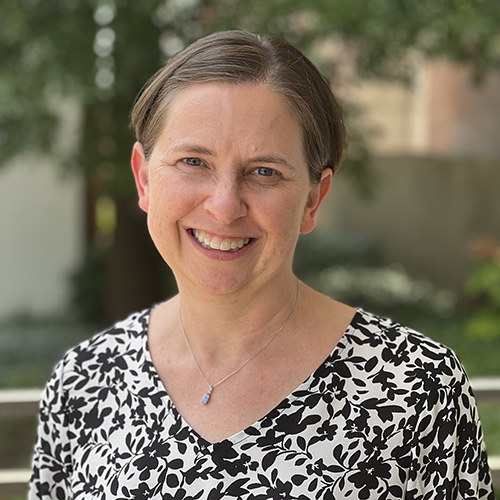
Kristine Hopkins
School of Optometry
Kristine B. Hopkins, O.D., MSPH, professor and associate dean for Academic Affairs in the School of Optometry, joined the school’s faculty in 1998, one year after she graduated from the school herself.
Hopkins started the Vision Therapy Clinic at UAB Eye Care in 2004, which has grown from 150 patients per year at its inception to more than 2,400 currently. She is the coursemaster of the Anomalies of Binocular Vision course series and “a natural educator,” according to a nominator, who went on to describe Hopkins as “an exceptional instructor with rigorous scientific method, a tremendous heart for students and a significant service contribution to the school.” As further proof, the nominator noted that Hopkins had received the 2008 and 2018 President’s Excellence in Teaching awards.
“Students describe Dr. Hopkins as ‘one of the most captivating professors there is at UABSO,’” another nominator wrote. “As a member of the curriculum committee, I am tasked with reviewing the SETs [students’ evaluation of teaching] each semester, and I have never read a negative student evaluation of her courses or as a clinical and didactic instructor.”
Hopkins’ research expertise, including leading a major multi-center randomized clinical trial that has had national impact, serves as an inspiration for students and faculty alike. “Her research background helps challenge us all,” the nominator said.
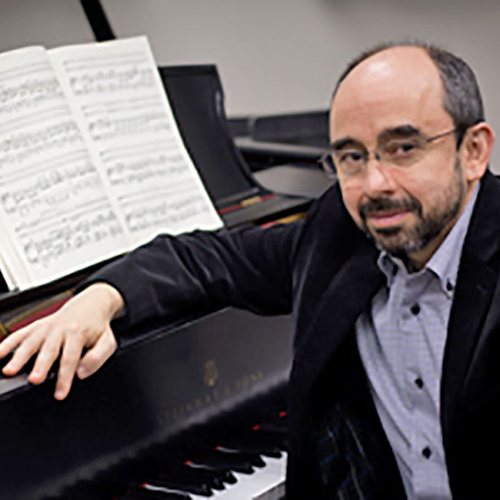
Yakov Kasman
College of Arts and Sciences
Yakov Kasman, DMA, Distinguished Professor and artist-in-residence in the Department of Music, is a world-renowned pianist and recording artist who was the Silver Medalist in the 10th Van Cliburn International Piano Competition in 1997.
Kasman’s students “have won hundreds of competition awards at the state, regional, national and international levels,” a nominator wrote. They have also gone on to graduate work at the Juilliard, Eastman and Peabody schools and other prestigious programs, as well as to professional careers.
“He not only teaches technique and literature and performance practice and stage deportment, but, perhaps more importantly, the role of art and the artist in society as a force for good, and the responsibility that talented musicians have to uphold the highest standards of ethics and professionalism,” the nominator wrote.
“In Dr. Kasman I have not only found an exceptional teacher but also a mentor and a role model,” a student wrote. “Dr. Kasman not only promotes ethical and professional values in all his students but also embodies these principles himself. His integrity, professionalism, dedication and commitment to excellence serve as a model for all who have the pleasure of working with him.”
”With Dr. Kasman as my teacher, I gained a deep appreciation and understanding of music that once made no sense to me at first listen,” another student wrote. “He not only taught me how to understand difficult music, but to love all kinds of music, and to play it well.”
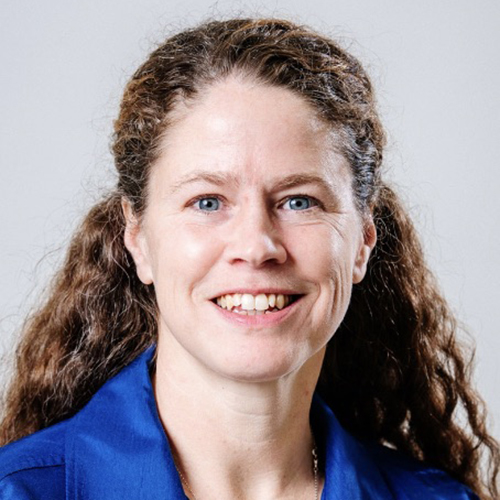
Tara Pearce
School of Health Professions
Colleagues describe Tara S. Pearce, P.T., MHS, DHS, associate professor and director of Clinical Education in the Department of Physical Therapy, as “innovative and excellent.”
“Before the pandemic, Dr. Pearce led the DPT students in simulated patient encounters through the UAB Office of Interprofessional Simulation,” a nominator wrote. After these experiences had to be canceled during the pandemic, “Dr. Pearce immediately collaborated with OIPS to develop and implement the first telehealth simulation at UAB. Dr. Pearce wrote the cases, trained the simulated patients and recruited the faculty as facilitators. Evidence of the activity’s success is that our program and other programs across campus continue to use telehealth simulation post-pandemic.”
Pearce is dedicated to consider the strengths and personal situations of each of the 180 students in UAB’s PT program before and during their clinical education experiences, colleagues say. “I never have to worry that this monumental task is being done with excellence, fairness and integrity,” one wrote.
An alumnus and current colleague recounted how Pearce handled the “extremely challenging situation” that came up during an outpatient rotation. “She dropped everything to reach out to the company, the clinical coordinator of clinical education and my clinical instructor directly to make sure that the environment remained safe and positive for the rest of my clinical experience,” the nominator wrote.
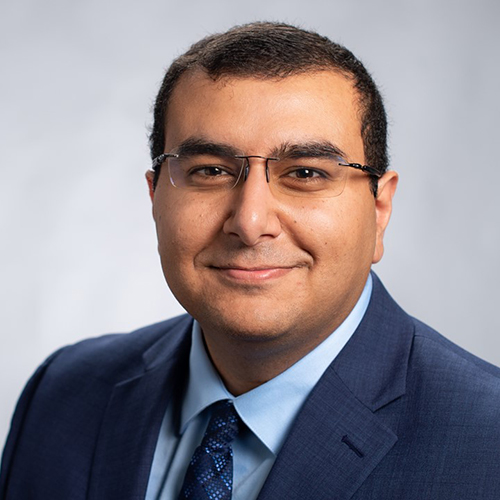
Muhammad Sherif
School of Engineering
Muhammad Sherif, Ph.D., is an assistant professor in the Department of Civil, Construction and Environmental Engineering. Sherif supports his students to succeed in their careers and lives through providing a positive learning environment in his classes, nominators said. “Dr. Sherif incorporates inclusiveness, personal support/encouragement, ethics, professional development and lifelong learning in his courses and across the curricula,” one wrote.
Sherif’s students “have highly praised his organizational skills, passion and high energy to deliver information and teach engineering concepts as evident from the IDEA surveys from more than 800 undergraduate and graduate students,” another nominator said. “In his classes, Dr. Sherif provides a judgment-free environment and an atmosphere of familiarity, trust and freedom of expression.”
Nominators also noted Sherif’s “successful mentoring of Ph.D./M.S. students toward graduation and publication of several articles” and “mentoring undergraduate students to conduct research and review papers.” This all occurred while he was “conducting extensive research (submitting and managing proposals/reports/papers and performing mechanical testing), service activities (i.e., serving on university, school and departmental committees, and outreach activities) and mentoring postdoctoral students,” they wrote.
Sherif’s Advanced Materials and Smart Infrastructure Systems (AMSIS) research group aims to develop and characterize the future generation of multifunctional materials and resilient structural systems. AMSIS includes two post-doctoral research associates, a Ph.D. student and four M.Sc. students. The AMSIS team focuses on several multidisciplinary thematic areas, including resilient, sustainable and smart materials; additive manufacturing; and structural health monitoring and decision-making systems.
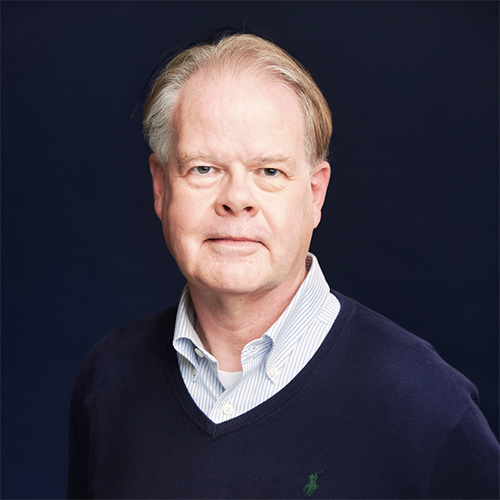
Peter Smith
Joint Health Sciences
Peter Smith, Ph.D., professor in the Department of Cell, Developmental and Integrative Biology, is known as an exceptional physiologist and cell biologist. He also is known for his innovative approaches in medical education, including integrating case-based assignments/presentations into his dentistry and optometry courses.
“Dr. Smith’s efforts in curriculum development and his contributions to medical education have set new standards in teaching excellence,” a nominator wrote. His “long-term commitment to excellence, inclusivity and innovation in education” at UAB span two decades, including “his roles in significant curriculum changes, such as the switch from a discipline-based to an organ-based curriculum and his directorship of various educational programs.”
“His approach to teaching, which has incorporated small group discussions, case studies, and hands‐on research experiences, has been instrumental in fostering a dynamic and interactive learning environment,” another nominator wrote.
Smith has received numerous teaching awards, including the President’s Award for Excellence in Teaching in 2004 and the Argus Award for Best First-Year Course Director from Heersink School of Medicine students four years in a row. And “Dr. Smith’s commitment to excellence in teaching is matched by his dedication to the professional development of his peers,” a nominator wrote.
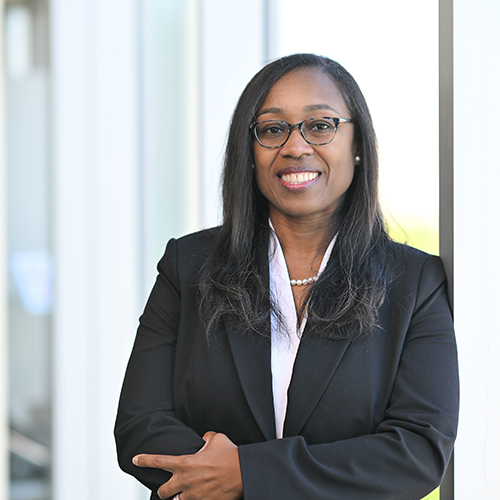
Tedra Smith
School of Nursing
Tedra Smith, DNP, CRNP, is associate professor in the Department of Nursing Family, Community and Health Systems and assistant dean for MSN Graduate Clinical Education and director of Pediatric Partnerships.
“Dr. Smith’s innovative teaching methods and commitment to student success have made her a trailblazer in nursing education,” a nominator wrote. “She has advanced our curriculum by strategically integrating simulation-based training, which has markedly improved our students’ clinical competencies.”
“She is globally recognized as a pediatric clinical expert and nurse practitioner educator with expertise in simulation and administrative leadership,” another nominator wrote.
Smith serves on various boards and committees, including the National League of Nursing Board of Directors and the National Organization of Nurse Practitioner Faculties Simulation Committee. “Dr. Smith also exemplifies our school’s core values through her active community engagement, notably with Children’s of Alabama and I3 Academy, where she has developed impactful health programs addressing local disparities,” the nominator wrote.
“Working with community partners including the UAB Live HealthSmart Mobile Wellness Unit and Mobile Market, Dr. Smith and UAB SON students provided health screenings including blood pressure, cholesterol checks and height and weight, along with access to fresh fruit and vegetable choices and information on Medicare and Medicaid,” a nominator wrote of her work with I3 Academy. “The workshop was a success, attended by over 300 participants.”
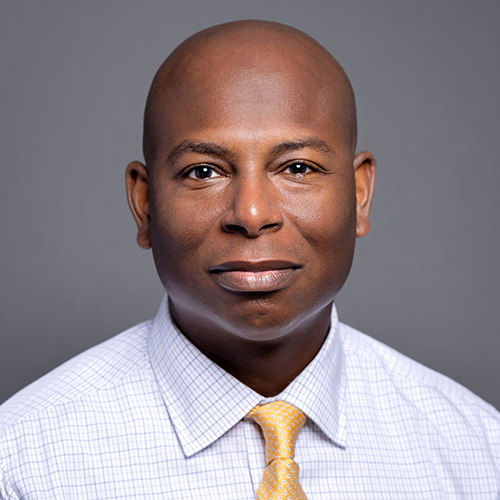
Larrell Wilkinson
School of Education & Human Sciences
Larrell L. Wilkinson, Ph.D., an associate professor and program director for the Community Health & Human Services program in the Department of Human Studies, focuses his research and teaching on health promotion and health services, including health disparities, health communication and health and human services utilization.
“Dr. Wilkinson fosters student learning through innovation and technology, administering the Wilkinson Wellness Lab in support of students gaining practical experience in health education/promotion,” a nominator wrote.
The lab “was born out of Dr. Wilkinson’s desire to directly engage with the Birmingham community through outreach, education and advocacy. It launched in the midst of the COVID–19 pandemic, as we were all still isolated, confused and stir-crazy,” another nominator wrote. “Misinformation was everywhere, so the lab was and continues to be our way to be a local source for accurate information that is responsive to the concerns of our community.”
Wilkinson “goes out of his way to provide out-of-class tutoring for his students, even for courses taught by other professors and even on weekends,” another nominator wrote. “He willingly met with me and other doctoral students who were struggling in our advanced statistics class on a Saturday to help us understand some concepts.”
“His teaching style has built my confidence and constantly reminds me of why I chose to pursue a Ph.D. at not just any school but UAB,” another nominator wrote.
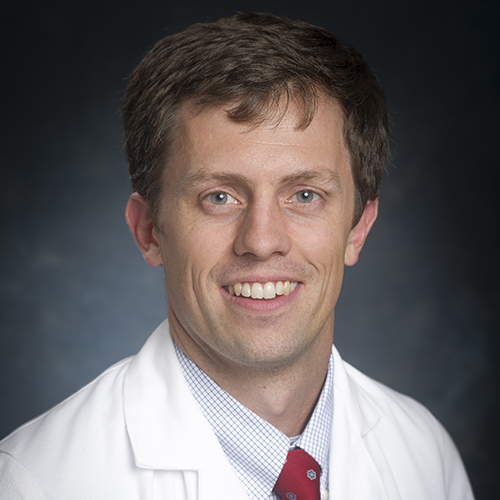
Winter Williams
Heersink School of Medicine
Since joining the faculty of the Heersink School of Medicine in 2013, Winter Williams, M.D., associate professor in the Division of General Internal Medicine, has received more than 20 teaching awards.
“Dr. Williams excels in the most traditional ‘classroom’ in medical education — at the patients’ bedside in the hospital and in the outpatient setting,” a nominator wrote. His clinical work as a hospitalist, resident clinic preceptor and attending on the inpatient wards ensures close contact with medical students and residents across a variety of settings.
“I greatly appreciated his approach to feedback as he was able to kindly give constructive criticism such that I could truly learn from the experience,” a student wrote.
Williams has also been active in many roles of educational leadership. He has served as a clerkship director for Internal Medicine since 2015. With William Sasser, M.D., from the Department of Pediatrics, Williams has led the Preparation for Residency course, which is now a core requirement for graduating fourth-year medical students.
More recently, Williams has taken a leadership role within the School of Medicine to oversee clinical reasoning and clinical skill development across the four-year arc of medical school. Through this role, he is applying his passion for assessment and curriculum development, topics on which he has numerous peer-reviewed publications and presentations. This work “inspires students, trainees and faculty to be curious and examine whatever problems they face with a scholar’s lens,” one nominator said.